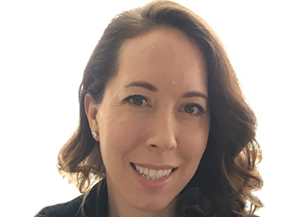Having come from a low-income family and relied on the numerous helpers in the community, Misty Farber was inspired to become a licensed clinical social worker. In her 20s, her mother was in the hospital when they received support from a social worker “who helped us through things and processing when we lost her.”
Today, Farber, recounting this memory as her turning point, said, “It’s these difficult life events that help me to help others better.”
Farber, a Clinical Training Program Manager for El Centro de Amistad (ECDA), chooses to take her life mission of helping as many children, families, and individuals as she can and apply it to her everyday role as a supervisor. “I’m inspiring the next generation of therapists and teaching students what I have learned to put their own spin and then practice it.”
Recognizing its social workers during National Social Work Month,ECDA has five social workers and four student interns from California State University, Northridge(CSUN) and University of Southern California (USC),who are deserving of being celebrated for the mental health therapy and advocacy they provide children, families, and individuals.
Prioritizing their clients’ mental health treatment, oftentimes “the most challenging area of being a social worker is taking care of themselves,” said Farber, who focuses first on checking in with the therapists and the interns and asks, “How are you doing?” She is well aware that how they are doing will impact how they deliver mental health services to their clients.
Social work burnout has become a reality, an all too familiar reality during the pandemic. According to Fierce Healthcare, “virtual therapy and psychiatry was up 302% compared to pre-COVID-19 averages.” Behavioral health specialists were also challenged by the emotional distress of the pandemic. Self-care practices are crucial to individuals in the field, which ECDA understands as they prioritize wellness for their workforce.
“Social work is a fast-growing field in the United States, and current events have contributed to the increasing interest in the field,” said Farber. According to the U.S. Bureau of Labor Statistics, “overall employment of social workers is projected to grow 12 percent from 2020 to 2030, faster than the average for all occupations. About 78,300 openings for social workers are projected each year, on average, over the decade.”
The nonprofit is currently hiring social workers. Farber explains that it takes around two months to train a new hire to learn the system and be matched with clients. A social worker at ECDA has a caseload of around 15 to 20 cases. They offer training programs for graduate students that would like to gain experience in social work and marriage family therapy.
Fatima Flores, an ECDA mental health clinician, was a graduate student at CSUN when she became an intern at the charity before getting hired. In her second-year placement, she pursued community-based mental health in San Fernando Valley, where she grew up.
“I knew I wanted to work with families who were low-income, people of color, and in my community,” said Flores. She was working in an environment where she felt appreciated and content with, so applying for the mental health clinician position was an easy decision. “I already had a small caseload, my clients who I had worked with, liked the population, issues we addressed, and the community.”
When asked what best describes being a social worker at ECDA, Farber shared a quote by Brené Brown,“Sometimes the bravest and most important thing you can do is just show up.” Farber continues, “we show up for our clients and help them in the best ways that we can, whether through therapy, advocacy, linkage, or empowerment. We are there for our clients and their families.”
“I’m working with people who, for them, this is their first encounter with mental health or first in their family to receive therapy and mental health support,” said Flores. “They share how this was a positive experience for them then they continue mental health services for other family members.”
Reducing mental health stigma, breaking the cycle of generational trauma, and empowering individuals to become resilient are some of the impacts social workers like Farber and Flores make in the lives of children, families, and individuals.
Learn more about ECDA careers and about their mission work at https://ecda.org/careers/.


